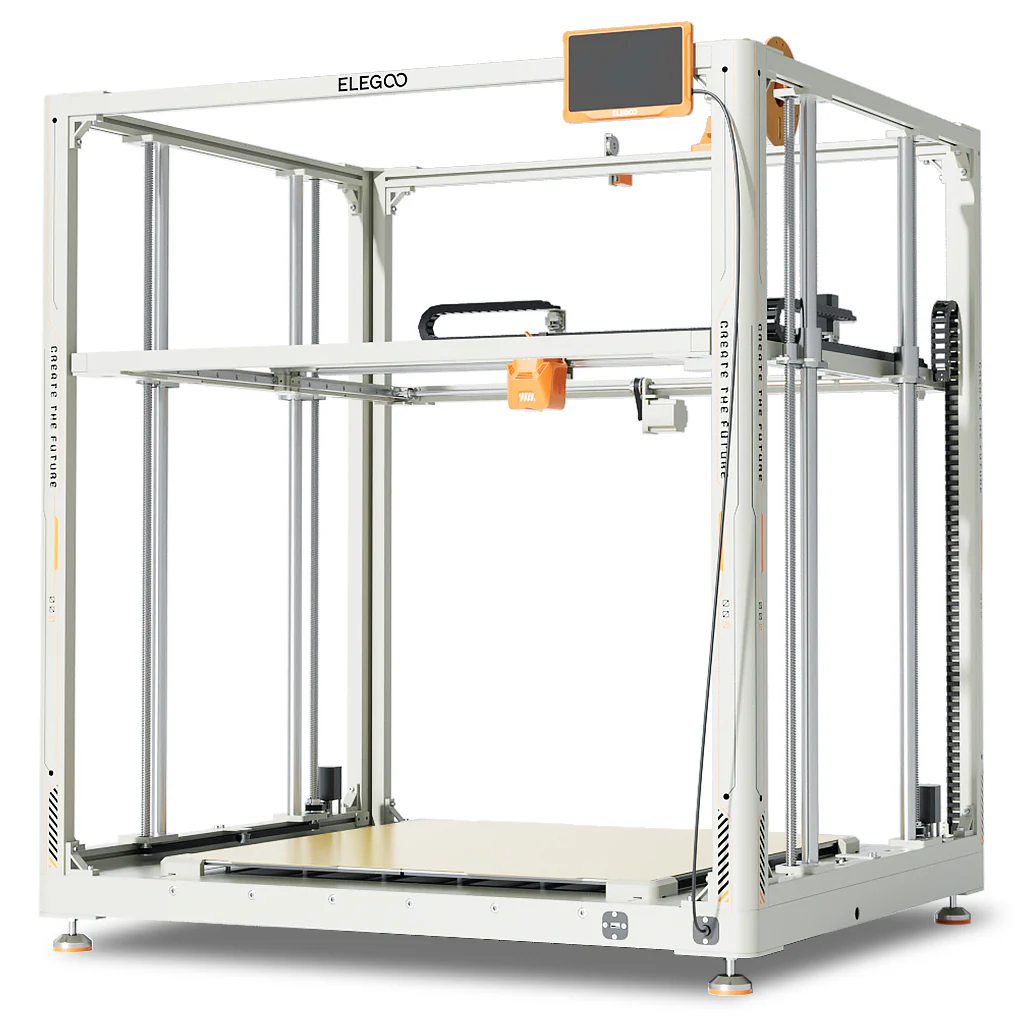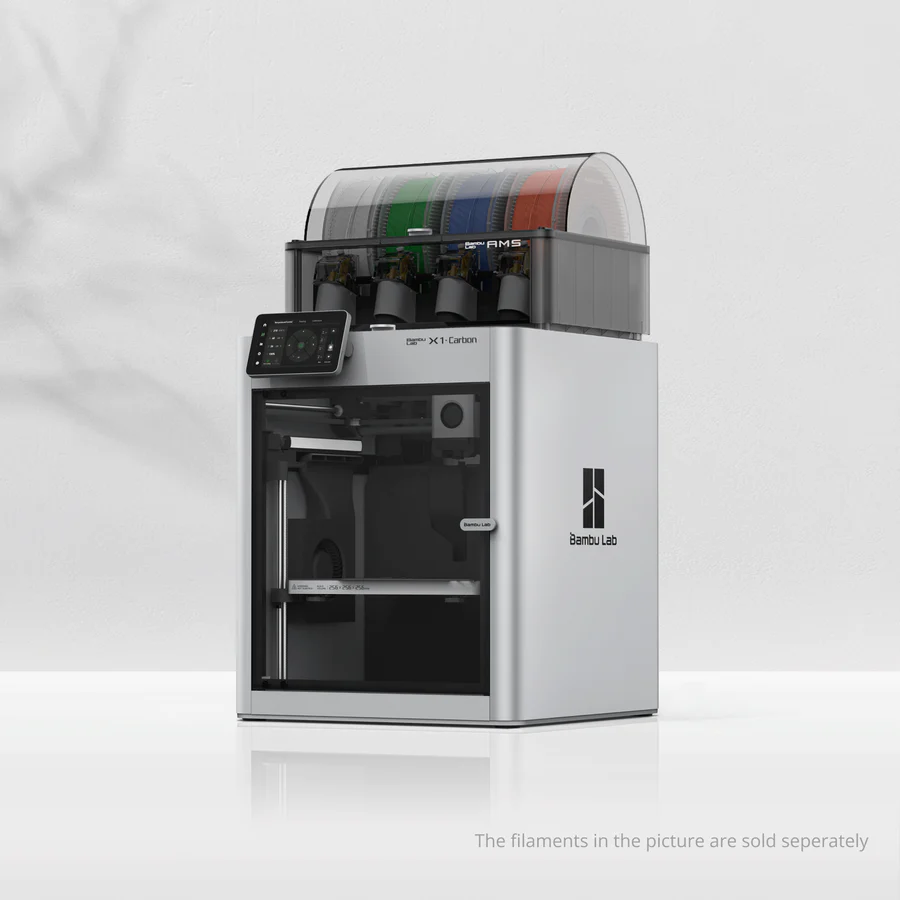Compare Elegoo Orange Storm Giga vs Bambu Lab X1 carbon
Comparison between the best 3D printers
Choose the best 3D printer at the best price. The cheapest 3D printers are here.
Buy a 3D printer here with 3D Fila.
 |
 |
|
| Model | Elegoo Orange Storm Giga[BUY Orange Storm Giga] |
Bambu Lab X1 carbon |
| Printing Material | Filament | Filament |
| Estimated price | $2500,00 | $1449,00 |
| Manufacturer | Elegoo | Bambu Lab |
| Release Year | 2024 | 2023 |
| Print Volume [mm] | 800x800x1000 | 256x256x256 |
| Printer Size [mm] | 1000x1000x1200 | 389x389x457 |
| Weight [kg] | 136 | 14,13 |
| Power Loss Recovery | YES | YES |
| Enclosed printer | NO | YES |
| Bed Leveling | Automatic | Automatic |
| Filament End Sensor | YES | YES |
| Bed type | Heated | Heated |
| Power supply system | Direct Drive | Direct Drive |
| Standard nozzle | 0,4 | 0,4 |
| Maximum Nozzle Temperature [°C] | 300 | 300 |
| Maximum Bed Temperature [°C] | 90 | 120 |
| Maximum printing speed [mm/s] | 300 | 500 |
| Filament holder | YES | YES |
| Camera for supervision | NO | YES |
| Recommended filaments | PLA, ABS< PETG, TPU | PLA, PETG, TPU, PVA, PA, PA-CF, Nylon, PC |
| Recommended slicers | Elegoo Cura | Bambu Studio, Super Slicer, Cura, Prusa Slicer, Orca |
| Maximum Resolution [mm] | 0,1 | 0,1 |
| Processor | Quad ARM A7 1.2 GHz | |
| Display | Touchscreen 7'' | Touchscreen 5'' |
| Power Supply | 350 W | |
| Connectivity | USB, LAN, Wi-Fi | Wifi, Bambu bus, Cartão SD |
| Operating systems | Windows, Linux e Macbook | Windows, Linux, Macbook |
| Date of registration in the system | 2024-10-09 | 2024-04-10 |
| Release date | 2024 | 2023 |
| Extra features | The Elegoo Orange Storm Giga stands out for its huge print volume of 800 x 800 x 1000 mm and its modular heated bed system with four independent zones, ensuring energy efficiency. It supports printing with multiple nozzles, allows print recovery after power failures and uses Klipper firmware, optimizing speed and quality. The portable 7-inch touchscreen and USB, Wi-Fi and LAN connectivity make operation more accessible and versatile. | The Bambu Lab X1 Carbon revolutionizes 3D printing with stunning design, high print speeds, and a streamlined user experience. It stands out with its CoreXY system, a hotend capable of reaching 300°C, allowing for a wide range of filaments. Its LiDAR-assisted bed leveling system, vibration compensation, and AMS multicolor printing capability raise the industry standard. Print quality is impressive, with the ability to fine-tune for perfection. The X1 Carbon, with its closed build volume, not only promises but also delivers one of the most advanced 3D printing experiences available to consumers. |
| Support for multiple colors and materials (AMS and CFS) | NO | YES |
Notes * |
||
| Cost-benefit | 6 / 10 | 7 / 10 |
| Hardware | 3.2 / 10 | 5.6 / 10 |
| Screen | . | . |
| Print volume | 10 / 10 | 4 / 10 |
| Performance | 3 / 10 | 4 / 10 |
| [BUY Orange Storm Giga] |
Conclusion |
| In comparing the Elegoo Orange Storm Giga and the Bambu Lab X1 Carbon, several key differences emerge that will guide potential buyers based on their needs and budgets. The Elegoo Orange Storm Giga offers a significantly larger print volume, making it ideal for users who require the ability to print larger objects. Its robust build, substantial weight, and modular heated bed system signify a focus on versatility and efficiency. However, it lacks some advanced features that the Bambu Lab X1 Carbon provides, such as the closed build environment and the support for more diverse filament types with its AMS multicolor printing capability. On the other hand, the Bambu Lab X1 Carbon shines in terms of technological advancements and user experience. It features faster printing speeds, LiDAR-assisted bed leveling, and excellent print quality, making it suitable for users looking for precision and performance in a compact format. Its closed design provides better temperature control and safety during operation, which can be crucial for more complex printing tasks. From a cost perspective, both printers are priced within a higher range depending on their respective capabilities. While the Orange Storm Giga appeals to those prioritizing print volume and modularity, the X1 Carbon is a strong contender for users focused on speed and versatility in filament use. Ultimately, the choice between these two formidable 3D printers should be dictated by individual printing needs: large volume versus advanced features and performance. Each offers commendable value in its own right, tailored to different types of 3D printing projects. |

